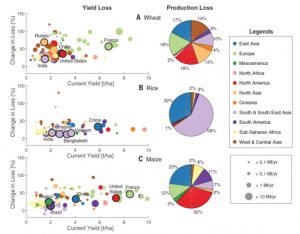Increase in crop losses to insect pests in a warming climate ($) Science
 Much has been discussed about the impacts of abiotic effects (e.g., heat and drought stress) on crop yields arising from climate change. Here, Deutsch and Tewksbury et al. evaluate how a changing climate will affect crop (wheat, rice and maize) yields through increases in insect herbivory. Temperature affects herbivorous insects in two ways. First, with rising temperatures, their metabolism (and food consumption rate) rises, and second, it can affect their rate of population growth. This latter effect is spatially more variable, as in some regions the temperature is optimal for insect lifecycle, and further temperature increases are likely to lead to a decrease in insect populations. The authors consider both of these factors at various temperature anomalies. The negative impact of insect herbivory is going to be particularly detrimental to wheat, which is grown in temperate regions. The authors summarize: “Without wider attention to how climate warming will affect crop breeding and sustainable pest management strategies, insect driven yield losses will result in reduced global grain supplies and higher staple food prices. Poor grain consumers and farming households, who account for a large share of the world’s 800 million people living in chronic hunger, will suffer most.” (Summary by Mary Williams) Science 10.1126/science.aat3466
Much has been discussed about the impacts of abiotic effects (e.g., heat and drought stress) on crop yields arising from climate change. Here, Deutsch and Tewksbury et al. evaluate how a changing climate will affect crop (wheat, rice and maize) yields through increases in insect herbivory. Temperature affects herbivorous insects in two ways. First, with rising temperatures, their metabolism (and food consumption rate) rises, and second, it can affect their rate of population growth. This latter effect is spatially more variable, as in some regions the temperature is optimal for insect lifecycle, and further temperature increases are likely to lead to a decrease in insect populations. The authors consider both of these factors at various temperature anomalies. The negative impact of insect herbivory is going to be particularly detrimental to wheat, which is grown in temperate regions. The authors summarize: “Without wider attention to how climate warming will affect crop breeding and sustainable pest management strategies, insect driven yield losses will result in reduced global grain supplies and higher staple food prices. Poor grain consumers and farming households, who account for a large share of the world’s 800 million people living in chronic hunger, will suffer most.” (Summary by Mary Williams) Science 10.1126/science.aat3466



